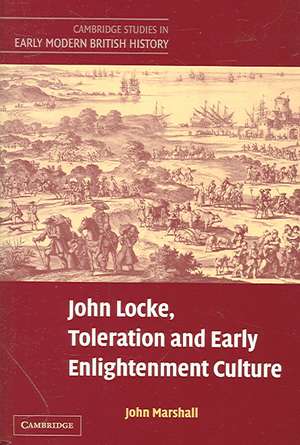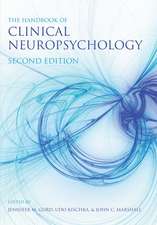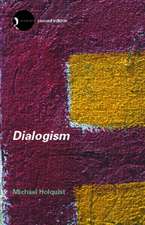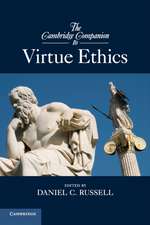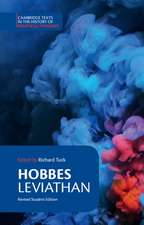John Locke, Toleration and Early Enlightenment Culture: Cambridge Studies in Early Modern British History
Autor John Marshallen Limba Engleză Hardback – 29 mar 2006
| Toate formatele și edițiile | Preț | Express |
|---|---|---|
| Paperback (1) | 443.64 lei 6-8 săpt. | |
| Cambridge University Press – 3 feb 2010 | 443.64 lei 6-8 săpt. | |
| Hardback (1) | 1223.82 lei 6-8 săpt. | |
| Cambridge University Press – 29 mar 2006 | 1223.82 lei 6-8 săpt. |
Din seria Cambridge Studies in Early Modern British History
-
 Preț: 195.92 lei
Preț: 195.92 lei - 8%
 Preț: 530.93 lei
Preț: 530.93 lei - 11%
 Preț: 693.36 lei
Preț: 693.36 lei -
 Preț: 317.75 lei
Preț: 317.75 lei -
 Preț: 240.74 lei
Preț: 240.74 lei - 8%
 Preț: 530.27 lei
Preț: 530.27 lei - 9%
 Preț: 627.56 lei
Preț: 627.56 lei -
 Preț: 350.34 lei
Preț: 350.34 lei - 14%
 Preț: 919.83 lei
Preț: 919.83 lei -
 Preț: 422.86 lei
Preț: 422.86 lei -
 Preț: 419.37 lei
Preț: 419.37 lei -
 Preț: 314.10 lei
Preț: 314.10 lei -
 Preț: 441.96 lei
Preț: 441.96 lei -
 Preț: 366.58 lei
Preț: 366.58 lei - 11%
 Preț: 695.39 lei
Preț: 695.39 lei -
 Preț: 278.34 lei
Preț: 278.34 lei -
 Preț: 426.88 lei
Preț: 426.88 lei - 14%
 Preț: 919.33 lei
Preț: 919.33 lei - 14%
 Preț: 773.45 lei
Preț: 773.45 lei -
 Preț: 211.02 lei
Preț: 211.02 lei -
 Preț: 334.35 lei
Preț: 334.35 lei - 14%
 Preț: 828.64 lei
Preț: 828.64 lei -
 Preț: 356.88 lei
Preț: 356.88 lei -
 Preț: 446.58 lei
Preț: 446.58 lei - 14%
 Preț: 830.20 lei
Preț: 830.20 lei -
 Preț: 284.39 lei
Preț: 284.39 lei - 14%
 Preț: 867.49 lei
Preț: 867.49 lei - 14%
 Preț: 963.64 lei
Preț: 963.64 lei -
 Preț: 336.20 lei
Preț: 336.20 lei -
 Preț: 445.81 lei
Preț: 445.81 lei -
 Preț: 274.11 lei
Preț: 274.11 lei -
 Preț: 362.54 lei
Preț: 362.54 lei - 14%
 Preț: 923.48 lei
Preț: 923.48 lei -
 Preț: 275.08 lei
Preț: 275.08 lei - 14%
 Preț: 733.64 lei
Preț: 733.64 lei -
 Preț: 276.39 lei
Preț: 276.39 lei -
 Preț: 336.48 lei
Preț: 336.48 lei -
 Preț: 408.81 lei
Preț: 408.81 lei -
 Preț: 309.27 lei
Preț: 309.27 lei -
 Preț: 369.67 lei
Preț: 369.67 lei -
 Preț: 274.27 lei
Preț: 274.27 lei - 14%
 Preț: 778.74 lei
Preț: 778.74 lei
Preț: 1223.82 lei
Preț vechi: 1423.04 lei
-14% Nou
Puncte Express: 1836
Preț estimativ în valută:
234.17€ • 244.50$ • 193.81£
234.17€ • 244.50$ • 193.81£
Carte tipărită la comandă
Livrare economică 04-18 aprilie
Preluare comenzi: 021 569.72.76
Specificații
ISBN-13: 9780521651141
ISBN-10: 052165114X
Pagini: 776
Dimensiuni: 161 x 235 x 59 mm
Greutate: 1.34 kg
Ediția:New.
Editura: Cambridge University Press
Colecția Cambridge University Press
Seria Cambridge Studies in Early Modern British History
Locul publicării:Cambridge, United Kingdom
ISBN-10: 052165114X
Pagini: 776
Dimensiuni: 161 x 235 x 59 mm
Greutate: 1.34 kg
Ediția:New.
Editura: Cambridge University Press
Colecția Cambridge University Press
Seria Cambridge Studies in Early Modern British History
Locul publicării:Cambridge, United Kingdom
Cuprins
Part I. Catholic and Protestant Intolerance in the Later Seventeenth Century: 1. Catholic intolerance, its representations in England c.1678–86, and Locke's Second Treatise; 2. Catholic intolerance and the significance of its representations in England, Ireland, and the Netherlands c.1687–92; 3. Protestant religious intolerance in England c.1660–c.1700; 4. Religious toleration and intolerance in the Netherlands and in the Huguenot community in exile; Part II. Justifications of Intolerance and the Emergence of Arguments for Toleration: Section 1: Justifications of Intolerance to c.1660: 5. Patristic and medieval sources of early modern intolerance: anathematising heretics and schismatics as seditious, pestilential poisoners, 'libertines' and 'sodomites'; 6. Heresy and schism, sedition and treason, and 'contrarities' and 'inversions' in the 'Last Days'; 7. Catholic and 'Magisterial Reformation' attacks on Anabaptism, Anti-Trinitarianism, and Atheism; 8. Anathematising heretics in sixteenth and early seventeenth century French religious polemic; 9. Antiheretical and antischismatic literature in England from the late sixteenth to the mid-seventeenth century; Section 2: The Emergence of Tolerationist Arguments and their Condemnation: 10. Early tolerationist arguments and their condemnation; 11. Arguments for and against religious toleration in the Netherlands c.1579–c.1680; 12. Toleration and intolerance, Jews and Muslims; Section 3: Catholic and Protestant Defences of Intolerance in the Later Seventeenth Century: 13. Catholic justifications of intolerance in the 1680s and 1690s; 14. Huguenot justifications of intolerance and debates over resistance in the 1680s and 1690s; 15. Justifying intolerance in England c.1660–c.1700; Part III. The 'Early Enlightenment' Defence of Toleration and the 'Republic of Letters' in the 1680s and 1690s: 16. Tolerationist associations in the 1680s and 1690s and virtuous service in the cause of toleration in the 'early enlightenment republic of letters'; 17. Political and economic arguments for religious toleration in the 1680s and 1690s; 18. Toleration, 'heretics' and 'schismatics'; 19. Toleration and Jews, Muslims, and 'Pagans'; 20. The historical argument for toleration and 'early Enlightenment' advocacy of 'humanity' and 'civility'; 21. Epistemological, philological, theological, and ethical arguments for religious toleration; 22. Toleration and the intolerant, Catholics, 'Atheists', 'Libertines' and 'sodomites'.
Recenzii
Review of the hardback: 'A powerful piece of scholarship - brilliantly conceived, breath-taking in scope, and rich in historical insight - it will be of interest to a wide variety of scholars across a range of disciplines (history, religion, political science, philosophy, history of science, literature, and queer studies). … a remarkable scholarly accomplishment. Marshall's book is surely destined to become a classic.' Catholic Historical Review
Review of the hardback: 'This is a vast intellectual undertaking, in some measures, comparable to Quentin Skinner's Foundations (1978), which aspires to outline the historical relationship between the theory and practice of religious intolerance and tolerance in Europe after the reformation and before the Enlightenment. Like Skinner's great work, it is committed to a contextual method to explain and understand the thinking of the times.' Journal of British Studies
Review of the hardback: '… this book is a tour de force. … Marshall is to be congratulated on an important study that identifies and anatomizes the intellectual history of one of the most significant moments in early modern European history.' H-net.Albion
Review of the hardback: 'Marshall's new text on the toleration debates should become a standard overview of the broad historical background of Locke's writing - both the toleration debates and the rise of the republic of letters.' Eighteenth Century Studies
Review of the hardback: '… in his magisterial tome … Marshall undertakes the massive task of describing the intellectual, religious, political, and cultural contexts in which discourses concerning toleration developed in early modern Europe. … Marshall has written an important and monumental work. Using works by Quentin Skinner, J. G. A. Pocock, and Jonathan Israel as historiographical models, Marshall seeks to provide, in appropriately Baroque detail, the full weight of arguments for and against toleration from the period of the Reformation to the late seventeenth century.' Sixteenth Century Journal
Review of the hardback: '… an outstanding contribution to the history of religious toleration … offers the most comprehensive treatment of the subject in the late seventeenth and early eighteenth centuries, the early years of the Enlightenment, that now exists.' Church History
Review of the hardback: ' … detailed, judicious and rewarding. Any intellectual historian concerned with the social and intellectual framework of toleration in the period, or with the early Enlightenment more broadly, is well served by this magisterial treatment … Marshall's scholarship is tremendous … Marshall's book opens new and valuable windows on the Early Enlightenment … the work is an immense contribution to Lockean and late seventeenth-century scholarship. … suberb.' History of Political Thought
Review of the hardback: 'This is a vast intellectual undertaking, in some measures, comparable to Quentin Skinner's Foundations (1978), which aspires to outline the historical relationship between the theory and practice of religious intolerance and tolerance in Europe after the reformation and before the Enlightenment. Like Skinner's great work, it is committed to a contextual method to explain and understand the thinking of the times.' Journal of British Studies
Review of the hardback: '… this book is a tour de force. … Marshall is to be congratulated on an important study that identifies and anatomizes the intellectual history of one of the most significant moments in early modern European history.' H-net.Albion
Review of the hardback: 'Marshall's new text on the toleration debates should become a standard overview of the broad historical background of Locke's writing - both the toleration debates and the rise of the republic of letters.' Eighteenth Century Studies
Review of the hardback: '… in his magisterial tome … Marshall undertakes the massive task of describing the intellectual, religious, political, and cultural contexts in which discourses concerning toleration developed in early modern Europe. … Marshall has written an important and monumental work. Using works by Quentin Skinner, J. G. A. Pocock, and Jonathan Israel as historiographical models, Marshall seeks to provide, in appropriately Baroque detail, the full weight of arguments for and against toleration from the period of the Reformation to the late seventeenth century.' Sixteenth Century Journal
Review of the hardback: '… an outstanding contribution to the history of religious toleration … offers the most comprehensive treatment of the subject in the late seventeenth and early eighteenth centuries, the early years of the Enlightenment, that now exists.' Church History
Review of the hardback: ' … detailed, judicious and rewarding. Any intellectual historian concerned with the social and intellectual framework of toleration in the period, or with the early Enlightenment more broadly, is well served by this magisterial treatment … Marshall's scholarship is tremendous … Marshall's book opens new and valuable windows on the Early Enlightenment … the work is an immense contribution to Lockean and late seventeenth-century scholarship. … suberb.' History of Political Thought
Descriere
Major intellectual and cultural history of intolerance and toleration in early modern Enlightenment Europe.
